He moved west in pursuit of a banking career but still had time for hockey, playing for the Brandon Wheat City club of the Manitoba Hockey League in 1905-06, scoring 6 times in 7 games. Ross was then added to the Kenora Thistles roster for their Stanley Cup challenge against the Montreal Wanderers, for which he was paid $1,000 for the two game series.
Teamed with the likes of future Hall of Famers Bad Joe Hall, Tommy Phillips and Tom Hooper, Kenora became the smallest town to ever win the Stanley Cup, as they defeated the Wanderers 4-2 and 8-6 to win the series 12 goals to 8 in the hostile territory of the Montreal Arena, which would figure in Ross' career later on as we shall see...
Ross moved back home to Montreal for the 1906-07 season and joined the very same Wanderers club he had helped dethrone as Stanley Cup holders, clearly having impressed the team management with his puck rushing style from his defensive position, a rarity in those days, as the defensemen of the day either fired the puck down the ice or deferred the forwards, passing it up to one at the first opportunity.
Thanks in part to his 8 goals in 10 games, the Wanderers would finish atop the Eastern Canada Amateur Hockey Association to retain the Stanley Cup they had won back from Kenora in a rematch two months after having lost it to the Thistles, of which Ross was not a part of. This would make Ross only the second player, after Jack Marshall, to win the cup two years in a row with two different clubs. Additionally, the Wanderers rebuffed challenges from the Ottawa Victorias, the Winnipeg Maple Leafs and the Toronto Argonauts that spring.
In January of 1908, Ross was a participant in the first all-star game in sports history, which was a benefit game for the family of the late Wanderers defender Hod Stuart, who drowned the previous summer.
For the 1908-09 season, Ross helped the Wanderers fend off another Stanley Cup challenge before the start of the regular season, a 13-10 defeat of the Edmonton Hockey Club. He scored twice in the Wanderers 9 games, but they lost the regular season title to the Ottawa Hockey Club and therefore their rights to the Stanley Cup. Ross was also hired by the Cobalt Silver Kings for a pair of playoff games, which they won to become Timiskaming Professional Hockey League champions.
It was back to Montreal for the 1909-10 season, this time with the All-Montreal Hockey Club as a player/manager in the upstart Canadian Hockey Association. Ross had scored 4 goals in 4 games before the league imploded in mid-January of 1910. Ross then caught on with the Haileybury Comets of the rival National Hockey Association, playing in 6 games and scoring 6 goals, which earned him $2,700.
Ross was lured back by the Wanderers, who were now members of the same NHA as Haileybury, for the 1910-11 season. He scored 4 times in 11 games and also enhanced his reputation as a tough player by knocking out the Quebec Bulldogs' Eddie Oatman, which started a massive brawl that required police intervention to break up!
The 1911-12 season saw Ross set a career high with 16 goals in 18 games followed by 11 goals in 19 games in 1912-13. After a salary dispute with the Wanderers, the two sides agreed to a new deal and Ross totaled 4 goals and 9 points in 1913-14.
Prior to the 1914-15 season, Ross attempted to persuade other players to leave their clubs and form a new league, which resulted in him being suspended. He responded by declaring himself a free agent. The president of the NHA then upped the suspension to cover all of organized hockey!
When is plan for a new league failed to gain traction, he applied to be reinstated to the NHA, which was granted in December 1914. The Wanderers were less than happy with Ross for the commotion and released him from the team. Ross then found a home with the Ottawa Senators.
Ottawa and the Wanderers finished with identical 14-6 records and a two game, total goal playoff was held to determine who would play the Pacific Coast Hockey Association's Vancouver Millionaires for the Stanley Cup. Ottawa won 4-0 in Game One and held off the Wanderers by despite a 1-0 loss in Game Two.
After scoring just 3 goals and 1 assist for Ottawa the previous season, Ross equaled a career high with 16 points in 1915-16 with 8 goals and 8 assists.
Somewhat surprisingly, following his acrimonious departure in 1914, Ross returned to Montreal and the Wanderers for the 1916-17 NHA season, in part to keep an eye on his Montreal sporting good store that he owned. He finished with 6 goals and 2 assists for the Wanderers in the final season for the NHA.
A new league was formed as part of some back room dealings, which brought an end to the NHA, but game rise to today's National Hockey League for 1917-18. In addition to his playing duties, Ross was also now the team's coach, but after just three games of the inaugural NHL season, the Wanderers aforementioned Montreal Arena was destroyed by a fire on January 2, 1918, which led to the financially struggling Wanderers folding their homeless franchise, which brought an abrupt end to Ross' playing days.
Ross managed to score but one goal in his three NHL games, but ironically, the league scoring championship trophy is named for the man who only scored once in his NHL career!
Ross remained active in hockey after his playing days concluded, which saw him coaching McGill University, becoming an NHL referee, coaching the Hamilton Tigers and then being hired by Charles Adams as the vice president, general manager, coach and scout for his NHL expansion franchise, which Ross himself dubbed the Boston Bruins.
In just five seasons, the Bruins, under Ross' leadership, rose from a 6-24 record to Stanley Cup champions. Ross became the first coach to ever pull his goalie late in a losing situation to gain an extra attacker in 1931. Before he retired in 1954 after 30 years with the club, the Bruins would win additional Stanley Cups in 1939 and 1941.
Ross was inducted into the Hockey Hall of Fame in 1949, specifically for his playing career, and not his long career as a team executive.
Today's featured jersey is a 1910-11 Montreal Wanderers Art Ross jersey. The Wanderers were formed in 1903 and were active until their arena burned down in 1918. All photographic records indicate the Wanderers wore the same white sweaters with a red band across the chest for their entire professional existence.
The Wanderers franchise finished first in the Federal Amateur Hockey League in 1904 before winning the ECHA championship in 1906 by defeating Ottawa in a two game, total goal playoff to capture the Stanley Cup.
They then won two more ECHA titles in 1907 and 1908 as well as turning away a challenge from the New Glasgow Cubs, winning back the Cup after losing it two months earlier to the Kenora Thistles, and then defending challenges for the cup from the Ottawa Victorias, Winnipeg Maple Leafs, Toronto Hockey Club and Edmonton Eskimos through March of 1909.

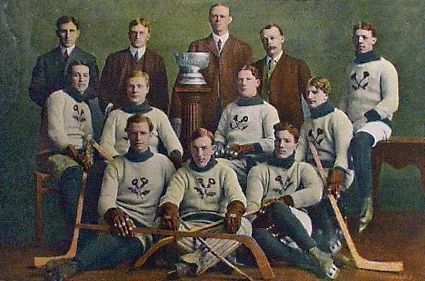
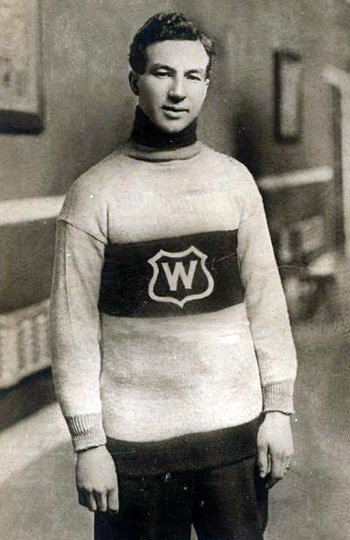
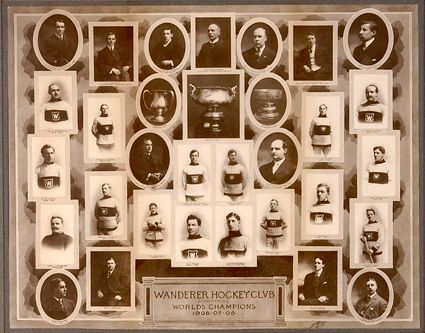
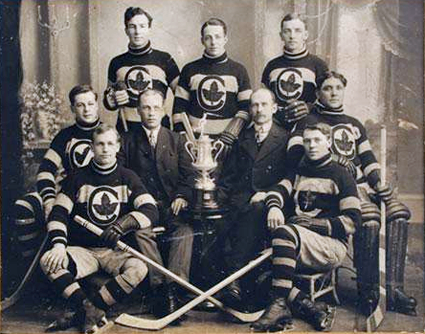
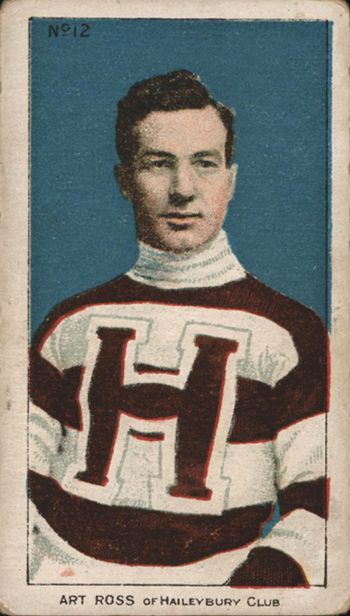
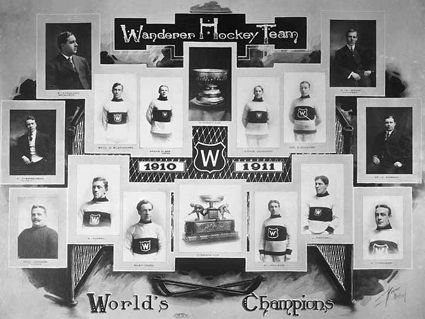
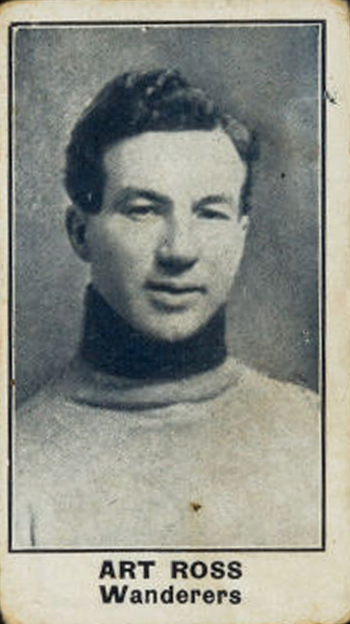
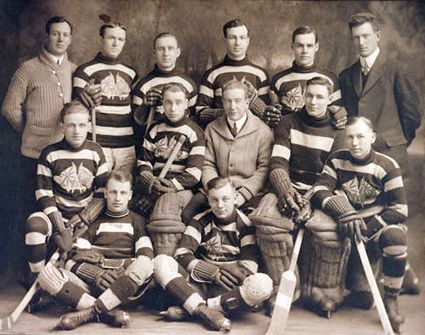
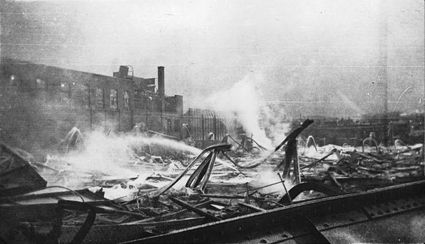
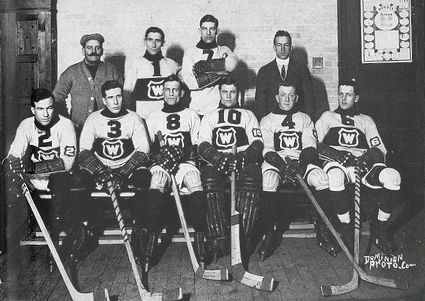
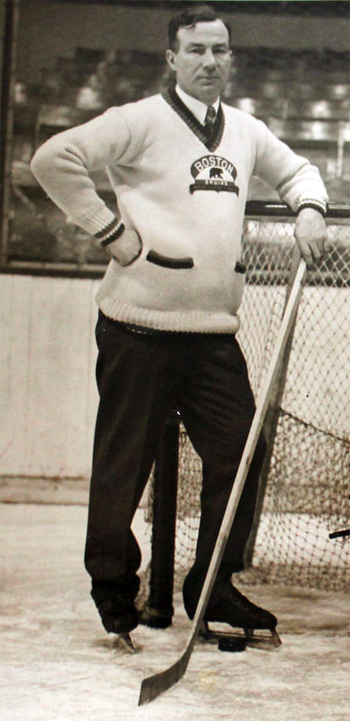
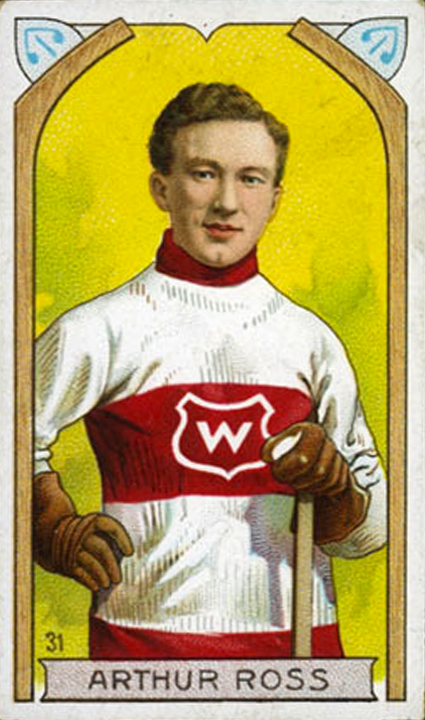










No comments:
Post a Comment
We welcome and encourage genuine comments and corrections from our readers. Please no spam. It will not be approved and never seen.